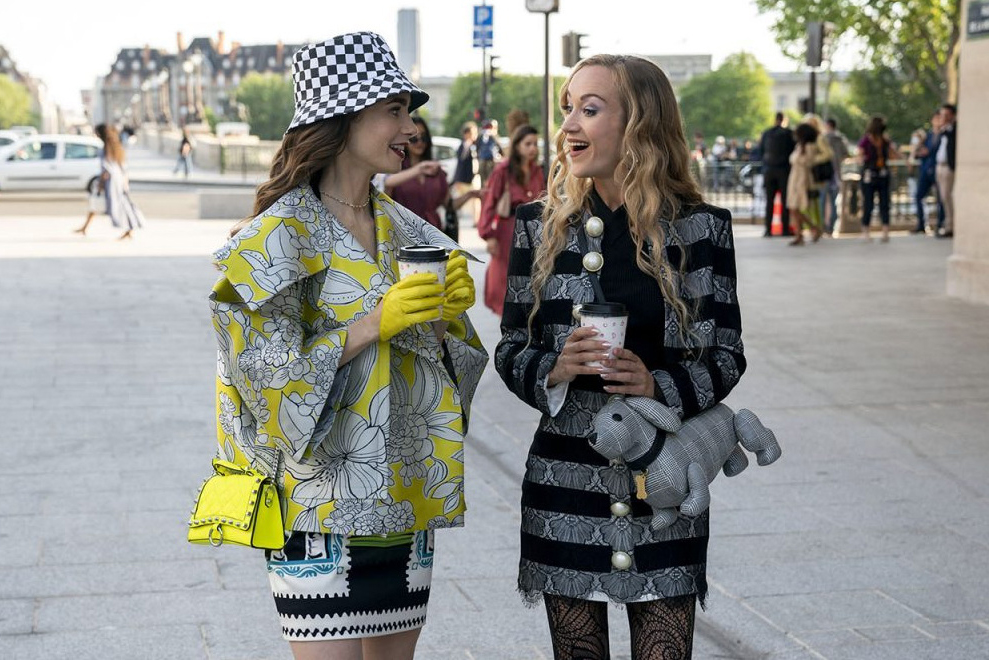 American actress Lily Collins (L) as Emily and Ukrainian actress Daryna Panchenko as Petra in a still from the Netflix series “Emily in Paris.” The show caused outrage in Ukraine, for the depiction of Petra, a Ukrainian character, as an ignorant and poorly dressed shoplifter. (Courtesy)
American actress Lily Collins (L) as Emily and Ukrainian actress Daryna Panchenko as Petra in a still from the Netflix series “Emily in Paris.” The show caused outrage in Ukraine, for the depiction of Petra, a Ukrainian character, as an ignorant and poorly dressed shoplifter. (Courtesy)An ignorant shoplifter with bad fashion sense – that’s how the hit Netflix romantic comedy series “Emily in Paris” portrayed a character named Petra, who happens to be a Ukrainian.
This creative decision caused outrage in Ukraine. Criticism from social media influencers, public officials and ordinary Ukrainians poured in after the show released its second season that introduces the character on Dec. 22.
Ukraine’s culture minister Oleksandr Tkachenko said he issued a complaint to Netflix, branding the depiction as an “offensive caricature” that is “unacceptable.”
“Is that how Ukrainians will be seen abroad? As those who steal, want to get everything for free, afraid of deportation? This should not be so,” he said on Telegram on Dec. 24.
Netflix’s response was “quite diplomatic,” Tkachenko later told Ukrainian media. The concerns of Ukrainian viewers “were heard.”
“We agreed that in 2022 we will be in closer contact to prevent such cases,” he said. “Such an active public position will help ensure the attitude of Ukrainians is taken into account in future filming.”
“Emily in Paris” is currently Netflix’s second most-watched show around the world. The first season was streamed by 58 million households in its first four weeks and was Netflix’s most popular comedy series of 2020.
The show follows the titular young American who moves to the French capital for a marketing job and swiftly becomes an influencer. In the fourth episode of season two, she meets Petra at a French class. They go shopping together, but Petra steals some clothes, encouraging Emily to do the same.
When Emily tells her to return the clothes, Petra yells in fluent Ukrainian: “Are you mad? I can’t do that! I’ll be deported for that!” Then she runs off for good.
Petra is played by the Ukrainian-born actress Daryna Panchenko, who is from Kyiv, like her character. Ukrainian media have reported that Panchenko deleted her Instagram after the incident.
Eugenia Havrylko, an actual Ukrainian influencer living in Paris, was among the first to criticize the depiction as “a cheap trick, absolute scandal and a shame.”
“You expose a Ukrainian woman as a person without any feeling of taste and dignity,” Havrylko said in an Instagram post that has collected over 77,000 likes. “And this is happening when there are so many talented Ukrainians, who are influencing worldwide markets?”
Ukrainian film critic Inna Gordeeva agreed and said that Netflix should delete the scenes with Petra, especially since they don’t drive the story.
“In the era of tolerance, to present a character of any nationality, race, gender, orientation in this way is strange and abnormal,” Gordeeva said in an Instagram post.
Oksana Matiyash, a Ukrainian educator who studied at Oxford, said that such movies and TV shows are responsible for the negative stereotypes about Ukraine around the world.
“Over 60 million people watch this show around the world, most of whom probably know very little about Kyiv and Ukraine. But now they will have this association,” Matiyash said on Facebook.
Many have pointed out that Petra is an unusual name to give a Ukrainian character since it’s rare in the country and more common elsewhere in Eastern Europe.
@netflix will you be issuing an apology for a caricature of a Ukrainian woman in #EmilyInParis2? Firstly, nobody’s called Petra in Ukraine; secondly, aren’t you supposed to be fighting the stereotypes and not maintaining them?
But there are also Ukrainians who defended the show. Film producer Natalka Yakymovych said that people should not expect all Ukrainian characters to be good, since they are not all good in real life. She said that the outrage that some Ukrainians feel comes from something akin to an inferiority complex.
“So in a TV series, negative characters can be anything but Ukrainian?,” Yakymovych wrote on Facebook. “Obviously, we all would like her to be from Moscow, but you don’t always get what you want.”
Yakymovych also added that there are many more important things that influence the image of Ukraine, like the sabotage of the anti-corruption prosecutor selection or a deputy interior minister swearing at police officers who tried to confirm his identity.
Yarema Dukh, a former spokesman for the Voice party, said that Ukrainians’ hostile reaction to “Emily in Paris” point to their own shortcomings. He thanked Netflix for writing “Kyiv” correctly (not Kiev) and making Petra a Ukrainian. It’s a lighthearted show that should not be taken seriously, he said.
“Has anyone seen the French go after the show with the posts: ‘We don’t sleep with everyone!’ (Because judging by the series, that’s what they do),” Dukh said on Facebook.
But French people did criticize the show after its premiere in 2020, saying it recycled outdated stereotypes about them being rude, beret-wearing chain-smokers who cheat on their partners.
“There’s plenty to feel insulted about watching ‘Emily in Paris.’ When they decided to caricature us, the authors didn’t hold back,” French critic Charles Martin wrote for Première. “No cliche is spared, not even the weakest.”
The American-produced show also faced criticism for the character of Alfie, Emily’s British love interest, who stereotypically spends his time drinking in pubs and watching football.
“You name a stereotype, and within the first three episodes, Emily has not only encountered it, but tried to rectify it, to adjust it to the American way,” U.K. critic Rebecca Nicholson wrote in The Guardian about the show’s first season, pronouncing it “tone-deaf.”
Darren Star, the series’ creator, has defended the show at the time as a love letter to the city and its offerings. The showrunner best known for the “Sex in the City” series, told the New York Times that he was “not sorry for looking at Paris through a glamorous lens.”
In a more recent interview with Elle UK, Lily Collins, who plays Emily and co-produces the show, declared that the series is trying to correct some of these perceived errors in its second season, saying that it would be “more inclusive and diverse” as a result.





